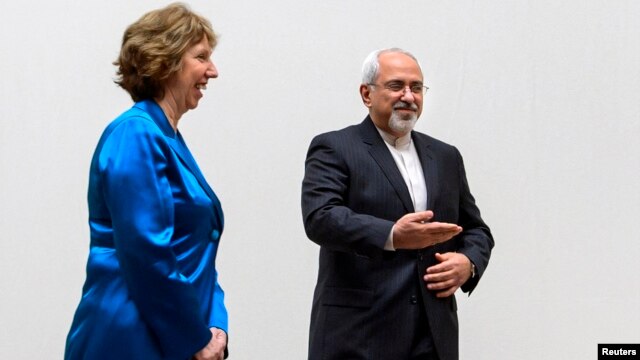
Iranian Foreign Minister Mohammad Javad Zarif (R) gestures next to European Union foreign policy chief Catherine Ashton , Oct. 15, 2013.
GENEVA — Iran has presented a proposal to world powers in negotiations over the country's nuclear program, as the two sides held their first talks since the election of a new Iranian president.
Speaking to reporters Tuesday in Geneva, European Union foreign affairs spokesman Michael Mann said he can not provide any details of the Iranian proposal.
But he said Iran's foreign minister made a nearly hour-long presentation to the United Nations contact group, with PowerPoint slides to lay out the new Iranian government's plan.
Western officials were hoping that Foreign Minister Mohammed Javad Zarif would provide a substantive response to the longstanding U.N. group proposal, that could be the basis for narrowing differences. But for now, the substance of the Iranian presentation is secret.
Officials said the international delegation, known as the P5+1, is willing to talk about a long-term solution to end concerns that Iran is working to build a nuclear weapon, and also short-term confidence-building measures that could include some easing of crippling economic sanctions. But Michael Mann said Iran must take the first step.
“The confidence-building measure has to come from the Iranian side. It is the Iranian side who we believe to be in breach of their international obligations. There are Security Council resolutions, IAEA [International Atomic Energy Agency] Board of Governors resolutions about the Iranian nuclear program. So, the way it is that the confidence-building measure that we have on the table is for the Iranians to take,” said Mann.
Iran said its nuclear program is for peaceful purposes only, but Mann said the goal of the negotiations is for Iran to prove to the international community that it does not have a nuclear weapons program.
Earlier, as the talks began, there were smiles all around the table, with anticipation that Iran's new government would offer fresh proposals that could move the process forward for the first time in years.
Iran and the six nations designated to represent the United Nations have been deadlocked over issues of transparency, nuclear fuel enrichment and stockpiles of near weapons grade uranium. The U.N. Security Council has imposed tough economic sanctions on Iran to press its leaders to be more forthcoming, and officials say the sanctions will remain as long as there is a reason for them.
Initially, the pressure did not result in any change. But in June, the Iranian people elected a relatively moderate candidate, Hassan Rouhani, as their new president, and he has signaled new policy. Western officials say this is Iran's chance to put substance to his conciliatory words. |
|
